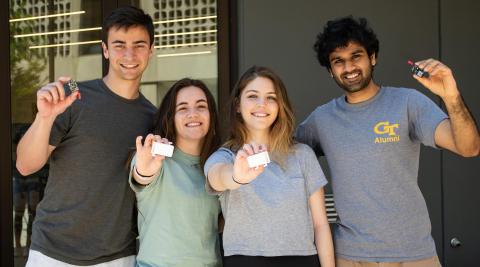Students from the School of Electrical and Computer Engineering (ECE) showed off their ingenuity and determination at last night’s Spring 2021 Capstone Design Expo. Teams with ECE students dominated the top awards winning best overall (StrideLink), best interdisciplinary (Grass Gurus), and one of three people’s choice awards (Flightie Talkie).
The virtual event hosted by Georgia Tech startup Gatherly included 971 students spread across 186 teams vying for a range of awards as they showcased their semester-long projects. They represented 10 schools from four of Georgia Tech’s six colleges, with some pursuing their own projects while others tackled problems pitched by sponsors that included Coca-Cola, USAID, Amazon Freight, Atlanta Department of Transportation, Emory Healthcare, Robins Air Force Base, and a host of Georgia Tech researchers.
Working under challenging circumstances brought on by the ongoing pandemic, students had to balance safety concerns and the challenges of working remotely or in small, distanced groups when circumstances permitted. This was the third Capstone Design Expo that was conducted virtually and almost 2,400 people attended.
The award for best overall project went to StrideLink, an unsponsored team of four students: computer engineering majors Marzeah Khorramabadi and Neel Narvekar, electrical engineering major Tony Wineman, and biomedical engineering major Cassandra McIltrot. The group set out with an ambitious goal of developing a low-cost gait analysis tool for physical therapists.
“We talked to 15 physical therapists and 12 researchers about gait analysis and we were able, as engineers, to look at how they did their jobs,” said Khorramabadi. “A large part of their job is watching people walk using only their naked eye and hearing their frustrations we were really motivated to build a device that would actually change the way that they help people.”
The team got to work designing a custom circuit board and 3D printed housing to create a wearable device that could go on a user’s shoe to measure their gait. Over the course of the semester, they worked with Georgia Tech research scientist Kinsey Herrin in Assistant Professor Aaron Young’s EPIC Lab to validate their device by comparing it to results from a $40,000 research grade gait analysis system. Their team’s results fell within their target range, varying from the research grade equipment’s results by just 0.5%, which was an impressive outcome considering that StrideLink built their device for less than $20. Those results impressed the CREATE-X program, and StrideLink will participate in Startup Launch in the coming months in an effort to commercialize their project.
Like StrideLink, the team that earned the award for best electrical and computer engineering project plans to keep working long after the semester ends. There were actually three teams tasked with developing a low-cost, neonatal incubator for a hospital in Ghana. It had to be easy to debug and capable of being manufactured locally, which posed challenges for the groups.
“Creating a product that can be fabricated, assembled, and used in a place that's so different from the one that we are building it in is a really important design constraint and one that I think that we tackled very well,” said mechanical engineering major Kyle Heiss.
The three groups became so emotionally invested in the project that they all want to see it through to completion.
“Meeting with the doctor and talking to him about his problem and seeing how important it was for him and his team and hospital, and then being able to deliver designs and documentation to him is really important to all of us,” said electrical engineering major Breanna Ivey.
The Grass Gurus team worked on a sponsored project for TTI, the parent company of brands that include Ryobi, Milwaukee, HomeLite, Hoover, and Dirt Devil, and took home the prize for top interdisciplinary project. The team of computer and mechanical engineering students developed a low-cost sensor for Ryobi electric lawnmowers that notifies the user when the grass bag attachment is full. The sponsors were thrilled with the design and are exploring how to implement it in their products.
One of three people’s choice awards went to Flightie Talkie, a team made up of ECE and mechanical engineering majors. They built a solution for two-way communication with people around a drone that can be used by the military to communicate with civilians or troops without putting themselves in danger.
For the full list of ECE award winners and their teams, please see below.
Watch the awards ceremony on YouTube.
Best Overall Project - StrideLink
Cassandra McIltrot (BME) - Sykesville, MD
Marzeah Khorramabadi (CmpE) - Birmingham, AL
Neel Narvekar (CmpE) - Arcadia, CA
Tony Wineman (EE) - Woodstock, GA
Electrical and Computer Engineering - Little Einsteins, Team Lavender, Capstone :)
Alton Stovall - Memphis, TN
Breanna Ivey - Macon, GA
Dorsey Beckles - Lithonia, GA
Hunter Ellison - Evans, GA
Jacques Crawford - Atlanta, GA
Joel Mathew - Grayson, GA
Benjamin Leverett - Douglasville, GA
Hussain Miyaziwala - Seattle, WA
Huy Hoang - Stockbridge, GA
Ismael Dondasse - Atlanta, GA
Michelle Ray - Puerto Rico
Ruth Pavoor - Duluth, GA
Cassidy Fountain - Cochran, GA
Karinne Bernanke - Charlotte, NC
Kyle Heiss - Wilmington, DE
Paige Gohr - Laguna Niguel, CA
Srijan Duggal - New Orleans, LA
Zachary Byrd - Brooks, GA
Interdisciplinary - Grass Gurus
Alex Field (ME) - Brookhaven, GAEli Tiemann (ME) - Millstadt, ILJoshua Shafran (CmpE) - Kingston, NYMaxwell Koerner (ME) - Penn Valley, PAPhillip Holloway (ME) - Atlanta, GASamuel Kiley (CmpE) - Duluth, GA
People's Choice - Flightie Talkie
Baran Usluel (EE) - Ankara, Turkey
Bing Guo (ME) - North Potomac, MD
Josiah Keene (ME) - Demorest, GA
Karl Andraos (ME) - Beirut, Lebanon
Mark Faingold (CmpE) - Saint Petersburg, Russia
